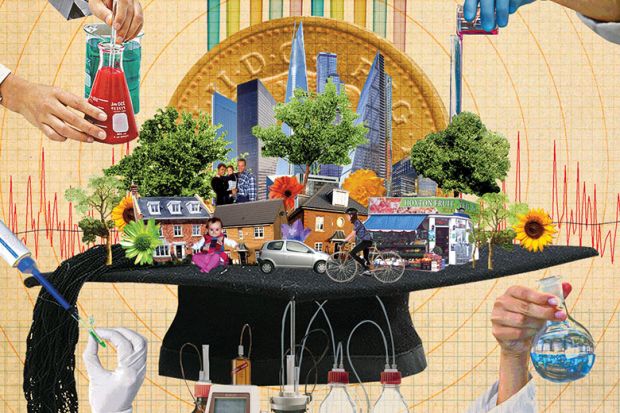These days, it is commonplace to assert that science should be done in ways that respond to societal needs and concerns. However, opinions are divided on how to achieve that, particularly within a bottom-up, curiosity-driven research environment.
As institutions that combine research, education and caring for the long-term health of our knowledge base, universities are uniquely placed to lead the debate forward. Currently, accountability is often based around narrow research metrics, which limit consideration of universities’ contributions to society to a few productivity indicators and, potentially, overlook other important core responsibilities.
As academic scientists, we often feel that our communities have not yet developed a language to fully grasp and communicate the entanglements of their research with society. Even though many researchers may be sensitive to social concerns, universities often do not provide incentives that would allow such concerns to inform the planning and conduct of research, or the education of the next generation of scientists. In a time-constrained environment, societal relevance feels a less urgent priority than acquiring funding, publishing high-impact papers, competing in evaluations or securing ongoing employment.
At the moment, the public value of universities is widely believed to be located solely “downstream”: in industrial applications, say, or in graduate start-ups, or in fostering economic growth by developing a highly skilled workforce. This is unfortunate because it implicitly equates responsibility with a narrow notion of innovation, focused on marketability.
The study of innovation trajectories has shown that knowledge often benefits society in indirect, complex and unforeseeable ways. A broader notion of responsibility that focuses on diverse forms of social relevance would highlight that even basic research is often motivated or guided by such concerns – not so much by direct and short-term applications but rather in contributing to a knowledge base that is relevant to a certain policy area or societal concern.
Universities’ social responsibility needs to be understood – by institutions and the wider public – as cultivating and caring for a broad knowledge ecology, harbouring the capacity to address the challenges of both today and tomorrow. Institutions should develop ideas about how to incorporate reflection on societal issues into their curricula and teaching. Currently, students are taught to focus on highly specialised skills and knowledge, but they rarely learn to contextualise this knowledge; a 2016 study of junior life scientists, of which two of us are co-authors, even suggests that current career dynamics do not allow those researchers to consider societal concerns until they reach more independent positions as group leaders.
Although a variety of tools are available to help universities build reflection on societal concerns into their curricula, it is important to bear in mind that there is no one-size-fits-all approach. Moreover, in the sphere of research, it is crucial that societal responsibility not be felt to impose extra burdens or to limit curiosity-driven research. Rather, it should merely broaden the basis of what drives this curiosity, based on a bottom-up debate in scientific communities about how it should be built into postgraduate programmes.
This reflective capacity is particularly important in a time of rapid change within research cultures. For example, the rise of big data poses fundamental challenges to how scientific fields produce knowledge and how they relate to society. In the case of environmental sciences, analysing big data collections provides great opportunities for studying climate change and creating environmentally friendly solutions. But if used as the only guide in policymaking, this risks overlooking the importance of also addressing human behaviour.
The procedures for assessing and promoting academics will also have a strong impact on how far social responsibility informs future scientific work. Universities should move beyond considering only productivity indicators in research and teaching and also consider the extent to which academics have learned to reflect on their research field in a societal context, and their talent in passing that ability on to the next generation.
In all cases, though, it should be borne in mind that very different social concerns and values are relevant in different scientific fields. Most importantly, societal responsibility should not be assessed on the basis of additional standardised metrics. This might invite a tick-box mentality and hinder researchers from weaving the concept into the fabric of their work in more meaningful ways.
Addressing public concerns is also an opportunity for universities to renew their self-understanding and to gain value and gravity in knowledge societies. In essence, we need cultural and institutional advancements that allow questions of societal responsibility to be integrated in dimensions of scientific excellence not as a matter of trade-off but of synergy. That would allow scientists to become academic citizens in a broader sense.
Ulrike Felt is professor of science and technology studies, Maximilian Fochler is assistant professor of science and technology studies, Andreas Richter is professor of ecosystem science, Renée Schroeder is professor of biochemistry, and Lisa Sigl is a postdoctoral researcher in science and technology studies. All are members of the interdisciplinary research platform Responsible Research and Innovation in Academic Practice at the University of Vienna. A longer version of this article can be read at https://blog.sts.univie.ac.at/.
POSTSCRIPT:
Print headline: Engage all areas
Register to continue
Why register?
- Registration is free and only takes a moment
- Once registered, you can read 3 articles a month
- Sign up for our newsletter
Subscribe
Or subscribe for unlimited access to:
- Unlimited access to news, views, insights & reviews
- Digital editions
- Digital access to THE’s university and college rankings analysis
Already registered or a current subscriber? Login









